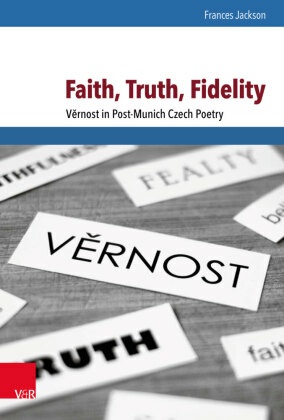
Faith, Truth, Fidelity - Vernost in Post-Munich Czech Poetry. Dissertationsschrift
| Verlag | Vandenhoeck & Ruprecht |
| Auflage | 2022 |
| Seiten | 310 |
| Format | 16,0 x 23,5 x 2,6 cm |
| Gewicht | 636 g |
| Artikeltyp | Englisches Buch |
| Reihe | Schnittstellen Band 024 |
| ISBN-10 | 352536430X |
| EAN | 9783525364307 |
| Bestell-Nr | 52536430A |
Though frequently acknowledged as a remarkable phase within Czech literary history, the poetic outpouring in the build-up to and aftermath of the Munich Agreement has received comparatively little rigorous scholarly attention to date. How did the Czech avant-garde react to the upheaval caused by the agreement? Frances Jackson provides the first comprehensive analysis of the poetic works of Frantisek Halas, Vladimír Holan, Josef Hora, Vítezslav Nezval and Jaroslav Seifert in the late 1930s and early 1940s.
Poetry not only as a sign of faith(fulness) or call for loyalty, but a constructor thereof in its own right.
Though frequently acknowledged as a remarkable phase within Czech literary history, the poetic outpouring in the build-up to and aftermath of the Munich Agreement has received comparatively little rigorous scholarly attention to date. In this study, Frances Jackson seeks redress to the balance, drawing on a range of theoretical instruments, including the idea of the event in both a narratological and more philosophical sense, and notions of rhetoric and authenticity. She establishes vernost ("faith(fulness)", "loyalty", "verity", "troth" etc.) as the distinguishing feature of collections such as Seifert's Zhasnete svetla or Halas' Torzo nadeje and demonstrates how this can be constructed poetically. Rather than viewing the period as a watershed moment per se, the study also situates its output within the context of late modernism, highlighting important parallels with contemporaneous English-language works.
Poetry not only as a sign of faith(fulness) or call for loyalty, but a constructor thereof in its own right.
Though frequently acknowledged as a remarkable phase within Czech literary history, the poetic outpouring in the build-up to and aftermath of the Munich Agreement has received comparatively little rigorous scholarly attention to date. In this study, Frances Jackson seeks redress to the balance, drawing on a range of theoretical instruments, including the idea of the event in both a narratological and more philosophical sense, and notions of rhetoric and authenticity. She establishes vernost ("faith(fulness)", "loyalty", "verity", "troth" etc.) as the distinguishing feature of collections such as Seifert's Zhasnete svetla or Halas' Torzo nadeje and demonstrates how this can be constructed poetically. Rather than viewing the period as a watershed moment per se, the study also situates its output within the context of late modernism, highlighting important parallels with contemporaneous English-language works.
